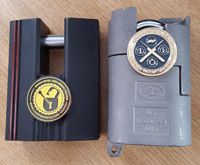Ok, so I don't have a lot of experience with lockpicking in general but I *do* have some experience with teaching and with running events.
Find out from your participants whether they'd be happy to pay a small fee first. If they're all friends, they might baulk at having to pay. That said, if you explain that you can provide them each with a kit to go away and practice themselves, they may be more amenable. You said set it so that they only have to pay if they take the toos in case they attend and decide it's definitely not for them, but then you'll be left with a load of un-needed beginner's picks. Depends how much you (and they) want to invest.
I'd say that supplying some basic kit - a couple of decent hooks of varying depths, maybe a bogota-style, maybe a half diamond and of course a couple of tension wrenches may be a good idea. Also maybe a couple of cheap padlocks, if nothing else so that they don't start practising on their front door.
Make sure you cover the two golden rules of lockpicking with them, too (Don't pick locks you don't own, don't pick locks in use). Drill it into them as if you were teaching the gun safety rules. Best to start people off on the right foot

. Of course, be mindful not to sound like a droning bore, too!
Oh, and make sure you provide refreshments, especially if it's a night-long thing. Nothing worse than attending an event with no drinks, nowhere to get snacks or a non-functioning toilet!!
Find a nice, simple guide to how locks work and lockpicking, preferably with large colour diagrams. Ideally, depending on the size of the group you could make a nice snappy powerpoint presentation guiding them through the basics. Or some basic print-outs. Then it's just a case of slowly showing them, step-by-step, how it works in real life. IMO no matter how many books you read and diagrams you study, nothing compares with actually -doing- (and watching) the thing. Then again, I have a more kinaesthetic learning style so maybe that's just me

Make sure that everyone has their own practice lock, or at least that there are enough of them that nobody is going to be waiting ages to "have a go". Make sure that everyone has stuff to read, look at and try out while they wait, if necessary, or while taking a cool off between attempts if they can't get it the first time.
Do start them on a nice easy lock, like the Master No.3, and have a couple of more advanced ones to hand for the fast learners. Get everyone talking, encourage questions and emphasise that no question is a bad/stupid/whatever question. All discussion is valuable. The amount of learning as a newbie on any subject can be immense so don't push them on too far or too fast - i.e. aside from a quick pictographic overview, leave security pins for another day - and try to keep the heavy "education" minimal and interweaved with hands-on. I've read somewhere that typically humans can only take in about 1 hour's worth of learning per day, and need a sleep to process it - I'm not sure how true this is and I can't find a source now I look, but it's worth bearing in mind.
In terms of the event specifics - how many friends are interested? 3? 5? 10? 20? 100? Obviously for a small group you can do an informal meet-up at your (or one of their) home(s) or "down the pub" at a locksport-friendly local, but as the group gets bigger you'll need to consider your provisions and location more carefully. An event room or Uni lecture hall would make it easier to delve into the technical stuff and do a proper presentation, but I suspect that's not the kind of scope that you're aiming at. Think about your audience - how many you have, their age and background, their interest level - are they technically-fascinated geeks or just bored and think lock picking sounds interesting?
Anyway, I'm not expert but I hope that gives you a few thoughts and things to consider. Let us know if you have any specific questions or more info and I'll do my best to help

.
Good luck and I hope your event goes well!







